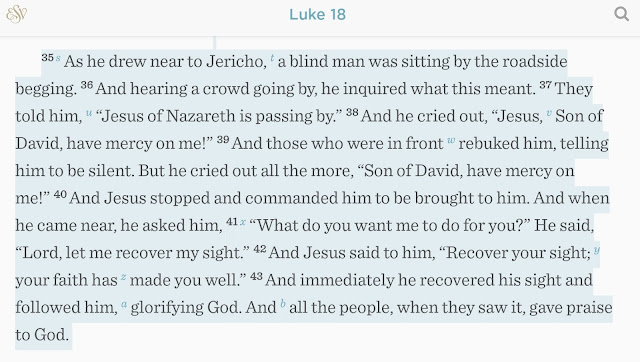Healing of Blind Beggar and Response
Breakdown
- Jesus was going to Jericho. As He was going, there was a blind sitting by the roadside begging.
- The blind man heard a crowd and inquired about it.
- inquire (πυνθάνομαι) - to seek and ask
- The crowd told him that Jesus of Nazareth was passing by.
- The blind man cried out to Jesus for mercy.
- mercy (ἐλεέω) - to be greatly concerned about someone in need; have compassion
- Those in front rebuked him and told him to be silent.
- rebuke (ἐπιτιμάω) - to express strong disapproval of someone, censure
- The blind man cried out all the more for mercy.
- all the more (μᾶλλον) - even more loudly
- Jesus stopped and commanded him to be brought to Him.
- The blind man came over to Jesus, and Jesus asked what he wanted Him to do for the blind man.
- The blind man wanted his sight to be recovered.
- recover (ἀναβλέπω) - regain; blind man was formerly able to see
- Jesus recovered the blind man's sight. The blind man's faith made him well.
- faith (πίστις) - in this instance, belief and trust in the Lord's help in physical and spiritual distress
- The blind man followed Christ and glorified God; the others glorified God as well.
Relation to Biblical Narrative and Our Response
- The Biblical Narrative is the idea of creation, fall, redemption, and restoration.
- Creation - God created the heavens and the earth and said it was good along with living animals and humans.
- Fall - Eve was tempted by Satan (who decided to reject God and become evil) to eat the fruit from the tree of the knowledge of good and evil which God said not to do. The devil said she could be like god determining right and wrong, and she fell for it. She ate the fruit and gave the fruit to Adam which he ate as well. Sin came into the world which separates us from God and the world became imperfect.
- Redemption - God sent His one and only Son into the world. Jesus came into the world and lived a perfect life in which He taught about the kingdom of God and performed miracles while also fulfilling the law and the prophets. He died on the cross as our substitute which means He took our place on the cross bearing the sins of mankind nailing them to it. He rose again from the dead to conquer sin and death. He sent the Holy Spirit into the world to convict people of sin and guide people to Himself. He tells us to repent and believe in Him and the Holy Spirit will regenerate us once that happens.
- Restoration - Jesus will come again to judge the living and the dead and a new kingdom (His kingdom) will be established where there will be no more sin. His elect will be in heaven with Him forever while the others will be in hell.
- God made the blind man in His image and likeness.
- As a result of Adam and Eve's sin, there have been diseases, sickness, and other problems in the world. God hates sin and loves the world so much He sent His Son to save people from sin. He is concerned about sin and knows people need a Savior.
- The blind man recognized His need for Jesus in his life so that he could see again.
- The crowd expressed strong disapproval of the blind man. Meanwhile, Jesus showed mercy to the man and had compassion for him. He performed a miracle and healed the man since the man trusted the Lord to help him in distress.
- Here is how one ought to respond:
- Turn to the Lord when you are in distress whether it's spiritual and/or physical.
- Ask Him for mercy and forgiveness and trust in His ability to help you with the power of the Holy Spirit.
- Recognize that it is by God's power, will, and timing for one to be healed physically.
- Express disapproval of sin and at the same time have concern for those who need saving.
- Explain the gospel and the need for repentance of one's sin and trusting fully in Christ recognizing that He is the Lord of their lives.
- Share that the Holy Spirit will regenerate them.
- State the fact that it is God's will, timing, and power for physical healing.
References
Arndt, W., Danker, F. W., Bauer, W., & Gingrich, F. W. (2000). A Greek-English lexicon of the New Testament and other early Christian literature (3rd ed.). Chicago: University of Chicago Press.
The Holy Bible: ESV. (2016). Wheaton, IL: Crossway Bibles.

Comments
Post a Comment